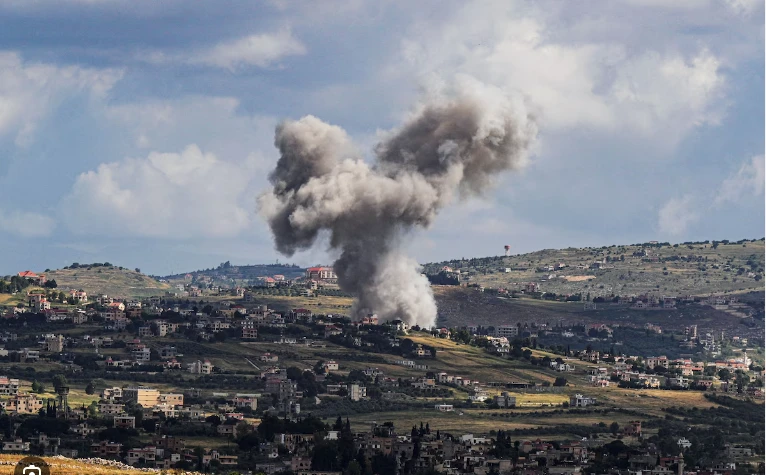Israel widens focus of attacks to include Lebanon front

Stay tuned with 24 News HD Android App

Israel announced the expansion of its war aims on Tuesday, widening its nearly year-long fight against Hamas in Gaza to focus on Hezbollah along its northern border with Lebanon.
The announcement came with US Secretary of State Antony Blinken due back in the region this week to try to revive stalled ceasefire talks for the Israel-Hamas war in Gaza.
Until now, Israel's objectives have been to crush Hamas and to bring home the hostages taken by Palestinian militants during the October 7 attacks that sparked the war.
While the focus of the war has been on Gaza, the unabating exchanges of fire between Israeli troops and Hamas ally Hezbollah in Lebanon have forced tens of thousands of people on both sides of the border to flee their homes.
"The political-security cabinet updated the goals of the war this evening, so that they include the following section: the safe return of the residents of the north to their homes," Israeli Prime Minister Benjamin Netanyahu's office said in a statement.
Not formally declared as a war, the exchanges of fire between Israeli troops and Hezbollah have killed hundreds of mostly fighters in Lebanon, and dozens of civilians and soldiers on the Israeli side.
The Israeli announcement came a day after Defence Minister Yoav Gallant said "military action" was the "only way left to ensure the return of Israel's northern communities".
- 'Fundamental change' -
Hezbollah, which like Hamas is backed by Israel's regional arch-foe Iran, claimed a dozen attacks on Israeli positions on Monday and three more on Tuesday.
Israel's military said it struck "terrorist" targets in Lebanon.
"The possibility for an agreement is running out as Hezbollah continues to tie itself to Hamas," Gallant was quoted as telling visiting US envoy Amos Hochstein in a statement from his office.
Netanyahu later told Hochstein he was seeking a "fundamental change" in the security situation on Israel's northern border.
Hezbollah deputy chief Naim Qassem said at the weekend that his group had "no intention of going to war", but that "there will be large losses on both sides" in the event of all-out conflict.
Hamas, meanwhile, said it was readying for more war, with assistance from fighters and support from across the region.
In a letter to the group's Yemeni allies, the Iran-backed Huthis, whose maritime attacks have disrupted global shipping, Hamas chief Yahya Sinwar said: "We have prepared ourselves to fight a long war of attrition."
"Our combined efforts with you" and with groups in Lebanon and Iraq "will break this enemy and inflict defeat on it", Sinwar said.
His comments came less than a week after Gallant said Hamas "no longer exists" as a military formation in Gaza.
- Blinken in Egypt -
While months of mediated negotiations and shuttle diplomacy have failed to pin down a ceasefire in Gaza, Washington said it was still pushing all sides to finalise an agreement.
To bridge the remaining gaps, the United States was working "expeditiously" on a new proposal, said State Department spokesman Matthew Miller.
Miller said Blinken would discuss the ceasefire drive during a visit to Egypt this week.
Blinken would "discuss ongoing efforts to reach a ceasefire in Gaza that secures the release of all hostages, alleviates the suffering of the Palestinian people, and helps establish broader regional security", Miller said.
Netanyahu has publicly rejected US assessments that the deal is nearly complete and has insisted on an Israeli military presence on the Egypt-Gaza border.
Mounting pressure has failed to sway him to agree to a hostage release deal that has wide support from the Israeli public.
The October 7 attack on southern Israel that sparked the war resulted in the deaths of 1,205 people, mostly civilians, according to an AFP tally based on official Israeli figures.
Militants also seized 251 hostages, 97 of whom are still held in Gaza, including 33 the Israeli military says are dead.
Israel's retaliatory military offensive has killed at least 41,226 people in Gaza, according to the Hamas-run territory's health ministry, which does not provide a breakdown of civilian and militant deaths.
- 'Collective punishment' -
On Tuesday, United Nations member states will debate a draft resolution demanding an end to the Israeli occupation of all Palestinian territories within 12 months.
General Assembly resolutions are not binding, but Israel has already denounced the new text as "disgraceful".
UN Secretary-General Antonio Guterres told AFP that "nothing justifies" the collective punishment of the Palestinian people.
"We all condemn the terror attacks made by Hamas, as well as the taking of the hostages, that is an absolute violation of international humanitarian law," he said.
"But the truth is that nothing justifies the collective punishment of the Palestinian people, and that is what we are witnessing in a dramatic way in Gaza."
In central Gaza on Monday, survivors scoured debris after Israel bombed the Nuseirat refugee camp.
Ten people were killed and 15 wounded in a strike on the Al-Qassas family home in Nuseirat, said a medic at Al-Awda Hospital.
"My house was hit while we were sleeping without any prior warning," said survivor Rashed al-Qassas.
